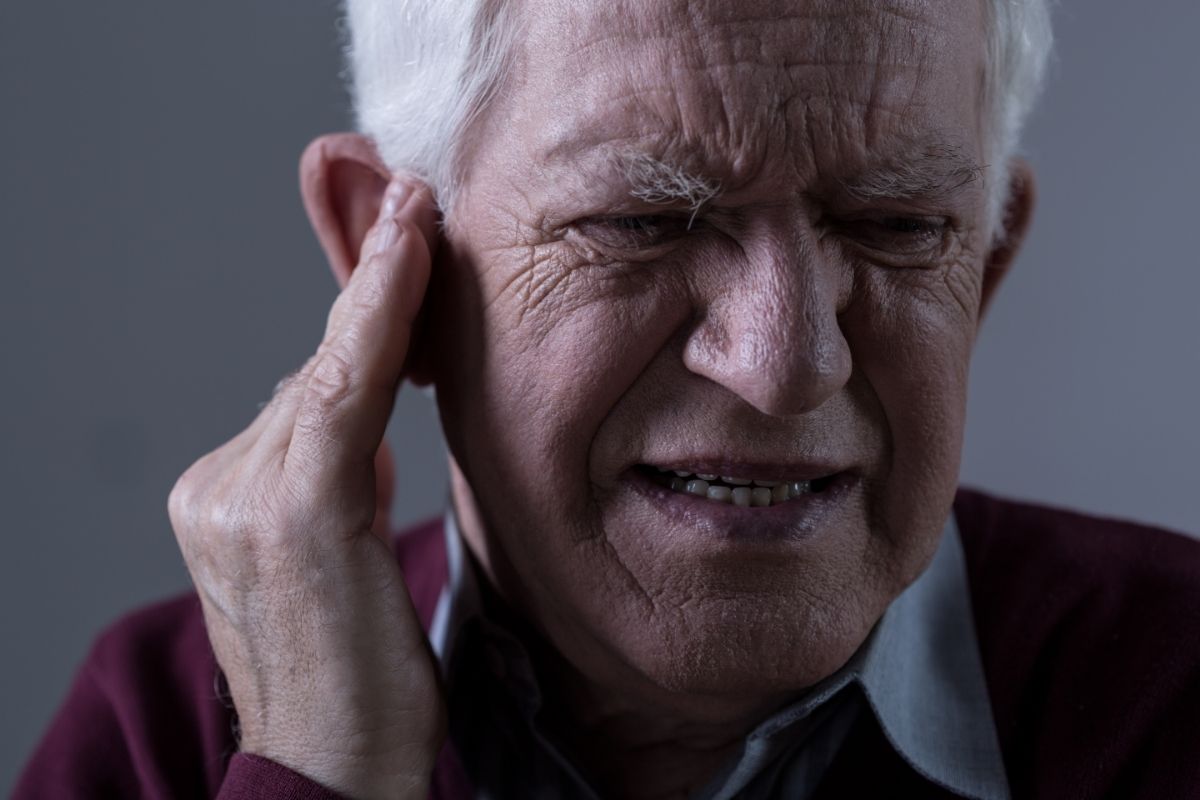Can Anxiety Cause Ringing In Ears?

Anxiety can cause ringing in your ears, and it’s not just your imagination playing tricks on you!
Imagine your brain as a rock concert, with anxiety as the overzealous sound technician cranking up the volume to 11.
Suddenly, you’re hearing things that aren’t there – a constant buzz, hum, or ring that’s driving you bonkers.
I’ve been there, folks.
One day, I’m minding my own business, and the next, it sounds like I’ve got a swarm of angry bees trapped in my head.
At first, I thought I was losing it.
But then I learned about anxiety-related tinnitus, and boy, did that open my eyes (and ears)!
Did you know that anxiety can cause a whole symphony of weird symptoms?
We’re talking fatigue, brain fog, muscle tension, and even that pesky ringing in your ears.
In fact, recent research suggests that up to 45% of people with tinnitus also have anxiety disorders.
That’s almost half!
In this guide, you’ll learn how to spot if your ear ringing is anxiety’s annoying little sidekick, what’s really going on in that complex noggin of yours, and most importantly, how to turn down the volume on both your anxiety and that phantom concert in your head.
Whether you’re a chronic worrier or just going through a stressful patch, this info could be a game-changer.
So, grab a comfy seat and let’s dive into the world of anxiety-related tinnitus.
By the end of this read, you’ll be equipped with the knowledge to calm both your mind and your ears.
Trust me, your future self (and your eardrums) will thank you!
Tinnitus: The Unwanted Ear DJ
Alright, let’s break it down.
Tinnitus is like having your own personal, unwanted DJ spinning tracks in your ears 24/7.
And let me tell you, this DJ’s playlist is not top 40 hits.
Picture this: you’re sitting in a quiet room, trying to relax, when suddenly you hear a high-pitched whistle.
Or maybe it’s more of a low hum.
Either way, there’s no actual sound source.
It’s all coming from inside your head.
Welcome to the wacky world of tinnitus!
Now, tinnitus isn’t picky about age, but it does seem to have a soft spot for the over-40 crowd.
It’s like that friend who shows up uninvited to your party – sometimes it’s just a brief, awkward visit, but other times it decides to crash on your couch indefinitely.
The tricky thing about tinnitus is that it’s not a condition itself, but a symptom of something else going on.
It’s like your ears are trying to tell you a secret, but they’re really bad at whispering.
The Anxiety-Tinnitus Tango
Now, here’s where things get interesting.
Anxiety and tinnitus often dance together, and let me tell you, it’s not a graceful waltz.
It’s more like a chaotic mosh pit.
You see, your brain is like a super complex switchboard.
When anxiety comes along, it starts flipping switches left and right.
One of those switches controls your hearing, and sometimes, anxiety accidentally cranks it up to 11.
Here’s the kicker: anxiety can cause tinnitus, and tinnitus can cause more anxiety.
It’s like a dog chasing its tail, except the dog is your brain and the tail is that annoying ringing in your ears.
Scientists think this happens because anxiety revs up activity in a part of your brain called the amygdala.
This little almond-shaped troublemaker is involved in processing sounds.
When it gets overexcited, it can make you hear things that aren’t there.
It’s like your brain’s own personal prank call.
But here’s a fun fact: not all ear ringing is anxiety-related.
Sometimes it’s caused by other things like ear infections, loud noises, or even certain medications.
That’s why it’s always a good idea to get your ears checked out if you start hearing the phantom DJ.
Is Your Tinnitus Anxiety’s Annoying Sidekick?
So, how do you know if your tinnitus is anxiety’s partner in crime?
Well, it’s like being a detective in your own head.
Here are some clues to look out for:
1. **The Timing**: Does the ringing start or get worse when you’re stressed?
If your ears start buzzing right before a big presentation or during a tense family dinner, anxiety might be the culprit.
2. **The Sound**: Anxiety-related tinnitus can sound like a lot of things.
Some people hear a high-pitched whistle, others a low rumble.
It might be a buzz, a hiss, or even a pulsing sound.
It’s like your brain’s got its own sound effects department.
3. **The Feeling**: Does your ear feel “full” or like there’s pressure in it?
That can be another sign of anxiety-related tinnitus.
It’s like your ear is trying to pop, but it just… won’t.
4. **The Pattern**: Does the sound come and go with your stress levels?
If it’s louder when you’re anxious and quieter when you’re calm, that’s a big clue.
5. **The Meds**: Are you taking any anxiety medications?
Some of these can actually cause or worsen tinnitus.
It’s like your medicine is playing a practical joke on you.
Remember, everyone’s experience is different.
Your anxiety tinnitus might sound like a tea kettle, while your friend’s sounds like a swarm of bees.
The important thing is to pay attention to your body and how it reacts to stress.
Should You Worry About Anxiety-Related Tinnitus?
Here’s the good news: anxiety-related tinnitus isn’t usually a sign of anything serious.
It’s more like an annoying party trick your brain has learned.
The bad news?
It can still be a real pain in the… ear.
It’s like having a mosquito buzzing around your head that you can’t swat away.
Here’s the thing: while anxiety-related tinnitus isn’t dangerous, it can be really distressing.
It’s hard to relax when it sounds like there’s a mini rock concert in your head.
And the more you stress about the noise, the louder it can seem to get.
It’s a vicious cycle, like a hamster wheel for your brain.
But don’t worry!
There are ways to turn down the volume on both your anxiety and your tinnitus.
And that’s exactly what we’re going to talk about next.
Taming the Tinnitus Beast
Alright, so you’ve got this unwanted symphony going on in your ears.
What now?
Well, I’ve got some tricks up my sleeve that might help:
1. **Chill Out**: The first step is to tackle that anxiety.
It’s like trying to fix a leaky faucet – you’ve got to turn off the water before you can fix the tap.
Try some relaxation techniques like deep breathing or meditation.
It’s like giving your brain a nice, calming bubble bath.
2. **Talk It Out**: Sometimes, anxiety is too big to handle on your own.
That’s where therapy comes in.
A good therapist is like a personal trainer for your brain, helping you build those mental muscles to fight anxiety.
3. **Ear Massage**: Some people find that gently massaging their ears can help reduce the ringing.
It’s like giving your ears a little spa day.
4. **Sound Therapy**: Try playing some white noise or nature sounds.
It’s like fighting fire with fire, or in this case, fighting noise with noise.
5. **Medication Check**: If you’re on anxiety meds, chat with your doctor.
Sometimes switching medications can help turn down the volume on that tinnitus.
Remember, dealing with anxiety-related tinnitus is a marathon, not a sprint.
It might take some time to find what works for you.
Be patient with yourself, and don’t be afraid to try different approaches.
When to Call in the Pros
Now, I know what you’re thinking.
“But what if it’s not anxiety?
What if there’s something seriously wrong with my ears?”
I hear you (pun intended), and that’s a valid concern.
Here’s the deal: while anxiety is a common cause of tinnitus, it’s not the only one.
That’s why it’s super important to get checked out by a doctor.
They can look in your ears and make sure there’s nothing funky going on in there.
A doctor visit is like getting a backstage pass to your ear health.
They might do some hearing tests, check for infections, or even refer you to an ear specialist if needed.
Plus, once you get the all-clear from the doc, you can focus on managing your anxiety without worrying about other potential causes.
It’s like clearing the stage so you can focus on the main act – taming that anxiety and tinnitus.
The Grand Finale: You’ve Got This!
Alright, folks, we’ve been on quite a journey through the land of anxiety and tinnitus.
Let’s recap what we’ve learned:
1. Anxiety can indeed cause that pesky ringing in your ears.
2. It’s not dangerous, but it can be super annoying.
3. There are ways to manage it, from relaxation techniques to therapy.
4. Always get checked out by a doctor to rule out other causes.
Remember, you’re not alone in this.
Millions of people deal with anxiety and tinnitus every day.
In fact, according to the American Tinnitus Association, about 15% of Americans experience some form of tinnitus.
That’s about 50 million people!
The key is to be patient with yourself and keep trying different strategies until you find what works for you.
It’s like tuning an instrument – it might take some tweaking, but eventually, you’ll find the right note.
So, the next time anxiety tries to turn up the volume in your head, remember: you’ve got the power to be your own sound engineer.
With the right tools and support, you can turn down the noise and turn up the peace in your life.
Now go forth and face that anxiety-related tinnitus like the rock star you are!

Author: Michelle Landeros, LMFT
Michelle Landeros is a Licensed Marriage Family Therapist (LMFT). She is passionate about helping individuals, couples and families thrive.









